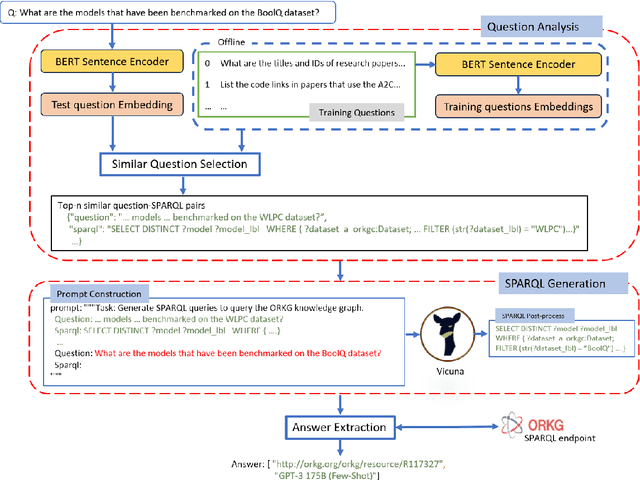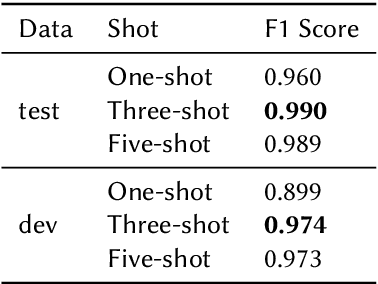Tilahun Abedissa Taffa
NFDI4DS Shared Tasks for Scholarly Document Processing
Sep 26, 2025Abstract:Shared tasks are powerful tools for advancing research through community-based standardised evaluation. As such, they play a key role in promoting findable, accessible, interoperable, and reusable (FAIR), as well as transparent and reproducible research practices. This paper presents an updated overview of twelve shared tasks developed and hosted under the German National Research Data Infrastructure for Data Science and Artificial Intelligence (NFDI4DS) consortium, covering a diverse set of challenges in scholarly document processing. Hosted at leading venues, the tasks foster methodological innovations and contribute open-access datasets, models, and tools for the broader research community, which are integrated into the consortium's research data infrastructure.
DBLPLink 2.0 -- An Entity Linker for the DBLP Scholarly Knowledge Graph
Jul 30, 2025


Abstract:In this work we present an entity linker for DBLP's 2025 version of RDF-based Knowledge Graph. Compared to the 2022 version, DBLP now considers publication venues as a new entity type called dblp:Stream. In the earlier version of DBLPLink, we trained KG-embeddings and re-rankers on a dataset to produce entity linkings. In contrast, in this work, we develop a zero-shot entity linker using LLMs using a novel method, where we re-rank candidate entities based on the log-probabilities of the "yes" token output at the penultimate layer of the LLM.
Hybrid-SQuAD: Hybrid Scholarly Question Answering Dataset
Dec 05, 2024Abstract:Existing Scholarly Question Answering (QA) methods typically target homogeneous data sources, relying solely on either text or Knowledge Graphs (KGs). However, scholarly information often spans heterogeneous sources, necessitating the development of QA systems that integrate information from multiple heterogeneous data sources. To address this challenge, we introduce Hybrid-SQuAD (Hybrid Scholarly Question Answering Dataset), a novel large-scale QA dataset designed to facilitate answering questions incorporating both text and KG facts. The dataset consists of 10.5K question-answer pairs generated by a large language model, leveraging the KGs DBLP and SemOpenAlex alongside corresponding text from Wikipedia. In addition, we propose a RAG-based baseline hybrid QA model, achieving an exact match score of 69.65 on the Hybrid-SQuAD test set.
Scholarly Question Answering using Large Language Models in the NFDI4DataScience Gateway
Jun 11, 2024Abstract:This paper introduces a scholarly Question Answering (QA) system on top of the NFDI4DataScience Gateway, employing a Retrieval Augmented Generation-based (RAG) approach. The NFDI4DS Gateway, as a foundational framework, offers a unified and intuitive interface for querying various scientific databases using federated search. The RAG-based scholarly QA, powered by a Large Language Model (LLM), facilitates dynamic interaction with search results, enhancing filtering capabilities and fostering a conversational engagement with the Gateway search. The effectiveness of both the Gateway and the scholarly QA system is demonstrated through experimental analysis.
Leveraging LLMs in Scholarly Knowledge Graph Question Answering
Nov 16, 2023



Abstract:This paper presents a scholarly Knowledge Graph Question Answering (KGQA) that answers bibliographic natural language questions by leveraging a large language model (LLM) in a few-shot manner. The model initially identifies the top-n similar training questions related to a given test question via a BERT-based sentence encoder and retrieves their corresponding SPARQL. Using the top-n similar question-SPARQL pairs as an example and the test question creates a prompt. Then pass the prompt to the LLM and generate a SPARQL. Finally, runs the SPARQL against the underlying KG - ORKG (Open Research KG) endpoint and returns an answer. Our system achieves an F1 score of 99.0%, on SciQA - one of the Scholarly-QALD-23 challenge benchmarks.
 Add to Chrome
Add to Chrome Add to Firefox
Add to Firefox Add to Edge
Add to Edge